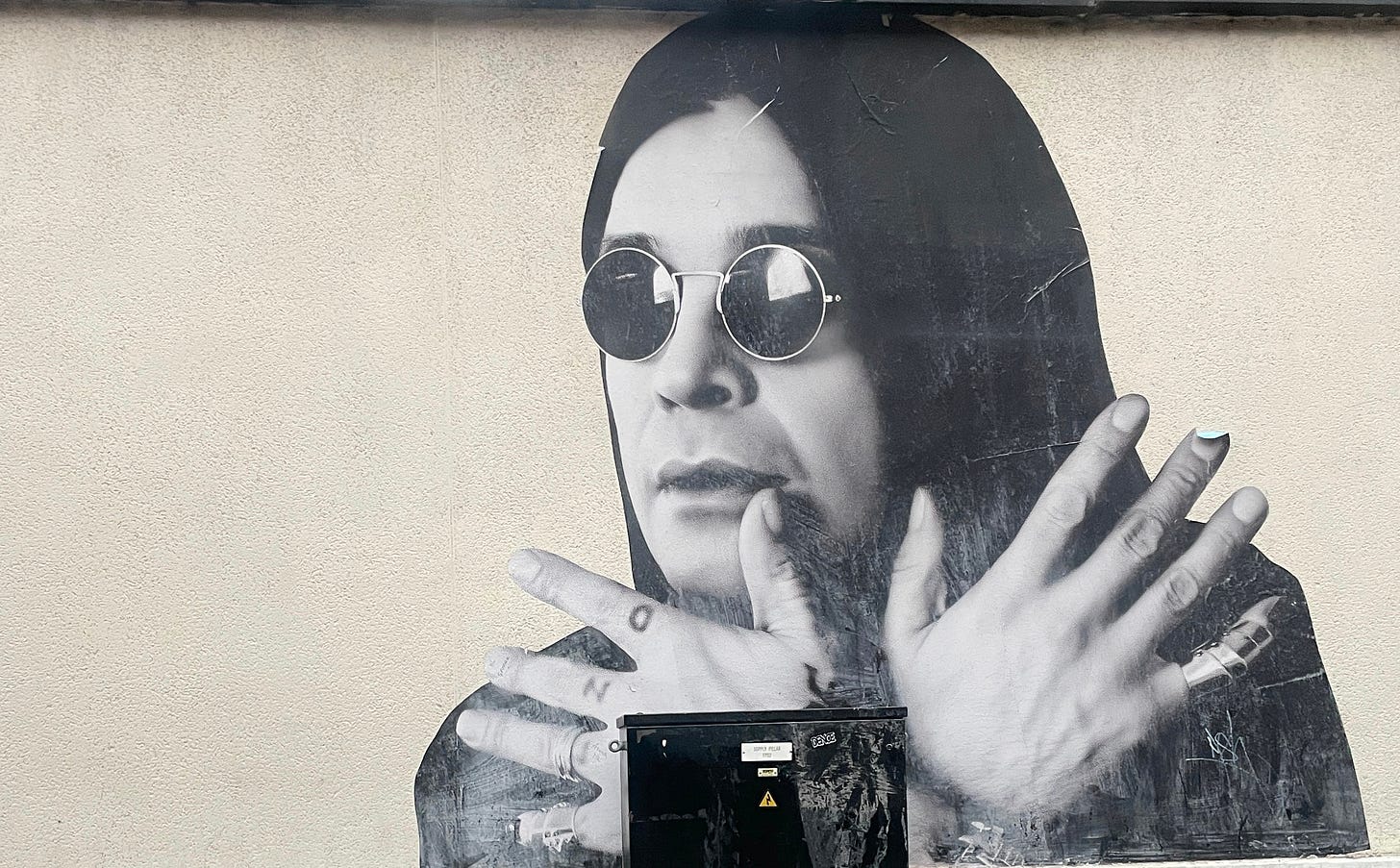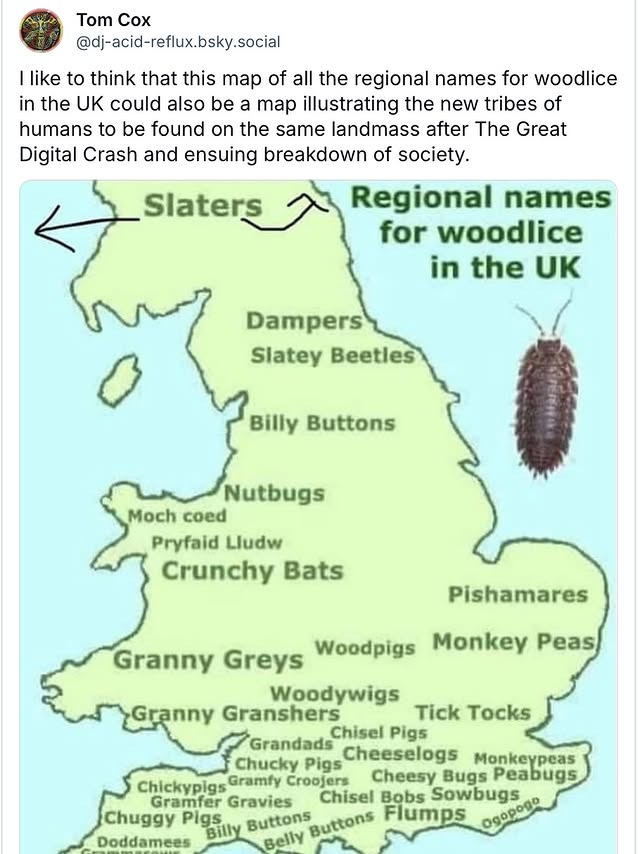#39: Flumps
Plus Englishness and the far right, a village ceremonialist, being an AI hater
You’re reading This Might Resonate, an occasional newsletter from me, Emily.
I help people to collaborate regeneratively and cultivate graceful endings through facilitation, coaching and grief tending.
Facilitation + Coaching
I help people to collaborate regeneratively and cultivate graceful endings through facilitation, ceremony, grief tending and coaching.
I have organisational facilitation capacity from January, and coaching capacity from November, get in touch if you’re interested.
I’ve been very fatigued for the past six weeks, so it’s been more bed and underworld navigation than work, really. As my friend N says, “you’re like a rare marine fairy who fought too many battles and needs a hero to deliver you some blue coloured gems or something to recover”. Quite! Please do send any heroes bearing blue gems my way.
I am slowly recuperating and enjoying some thoughtful work:
A leadership coaching programme with treasured colleagues in the NHS
Beginning the process with a friend and neighbour for holding a naming ceremony for her two girls next year. I have the words “village ceremonialist” on my vision board and what with this, Megan’s ceremony in the summer and some grief tending rituals in the offing for 2026, perhaps it is coming to pass! From said friend: “I feel like maybe most people couldn’t immediately name their dream ceremony/ space holder, but we can”. I’d love to do more of this work next year, get in touch if you have a moment or threshold you’d like to honour.
Shoutout also to the wonderful Deceleration Assembly a few weeks ago, where 100 curious, kind people gathered in Birmingham to explore organisational endings. I experienced it as a rare and precious event. I attended masked and very under the weather — so much so that I couldn’t hold my planned grief circle.
Instead, with the kind organisers’ blessing and help, I improvised a grief shrine, a space where people could feel and express their sorrow, rather than talking about it in the more abstracted ways that a professional space can invite. I saw one woman pick up the stick, turn it over and over in her hands, and then clutch it to her chest, lowering her head in a moment of quiet, or perhaps communion. People wrote little notes to add to the Grief Soup, or poured some water. A good reminder that sometimes we don’t need bells and whistles — a plastic bucket, some sprigs of rosemary and some hastily scrawled invitations can do a lot. I wrote more about the shrine here.
Speaking
When I got back from my three-week Sweden trip at the end of August, my first outing was to folk band practice. My bandmates picked me up in their van and we trundled across the roundabout at the end of my road, on our way out of the regional city I live in. It was early evening, a Thursday. In the middle of the roundabout were two teenagers, spraying a St George’s cross, absolutely giddy with transgressive glee. I turned to watch them recede in the rear window, with the sick feeling that a fiercesome, destructive force had broken free of its threadbare restraints.
Two weeks later, 13th September, it was the far right march in London. This was the day that Nkem Ndefo and I had scheduled to speak, as part of the Lumos Transforms Community Chat series. Nkem starts every conversation with a version of “what’s alive for you right now”. Truthfully, it was the march, so that’s how we began, then flowing into a discussion of activism and ableism, and what it means to cultivate presence as a facilitator. It was an edge for me to talk about the far right. I often feel tongue-tied with this topic, lacking in incisive political analysis or movement experience. But I’m glad I did, it took our conversation to some unexpected places.
To watch, sign up to the Lumos Community platform (it’s free for one month, you can cancel anytime, and while signed up, you can watch Nkem’s Q&As with visionaries like Prentis Hemphill,
, and ). I’ve followed Nkem’s and Lumos Transforms’ work on trauma, embodiment, healing and transformation for years so it was truly an honour to be part of the series.Energy allowing, I look forward to experiencing Nkem’s work in person next week — they’re touring the UK with Healing Justice London, check out dates and locations here. See you in Bristol?
(
skillfully engages with Nkem’s work in her Radical Hospitality article below, have a read).Reading
The thoughtful, funny, tender Who Wants to Live Forever by the incredible
(who writes a great newsletter too). I know exactly which of my exes would take life extension drug Yareta, and this is surely the mark of successful world-building.The Bible of British Taste: Stories of Home, People and Place. Beautiful interiors, but the photos were shot with an iPhone and it shows. They’re too low quality for full page images, which is frustrating for a coffee table book of visuals. Bring back photographers!
My favourite “org design” piece I’ve read in a long time is by the great
: Radical Hospitality Part III: The Alchemy of Care in Organisational Life. I was very lucky to facilitate and learn from Amahra and her team two years ago as they explored care and accountability. I love the wisdom of where this enquiry has landed: “This kind of hospitality is not a promise of sanctuary; it’s a practice of stewardship. It says: you are welcome here, and you are also responsible here. It refuses both the transactional logic of corporate belonging and the familial overreach of movement culture. It invites us into right relationship — one that recognises the limits of what an organisation can hold and the abundance of what it can make possible when those limits are respected.”So many of the leaders I work with experience the oscillation “between rigidity and chaos” that Amahra writes about. I see much confusion about what organisations can and can’t offer us, as tender humans yearning for belonging. Amahra’s piece will become one that I sent to clients! It reminds me also of
’s incredibly helpful Healthy Human Culture framework, particularly how health comes from the balance and flow between archetypes (for example, Strength and Love).I really loved this
interview with : “It’s not an accident that I started off at the BBC thinking that I could get my hand on the levers of culture, and then I ran a think tank believing I could shift the policy landscape, and now I just live in a commune… So what is the work that is asked of us? It’s personal, and in our families, and in our communities, and in our networks.” of (and Deceleration Assembly above) was fascinating and covered some similar themes through the lens of organisational endings: “there’s this one woman in Scotland who said on a call the other day: When I first started working alongside The Decelerator, I thought, well, what we need to do is just make the fundraising and the financing problem go away. She said two years on: if a magic money tree came along tomorrow, we still wouldn’t be okay. We wouldn’t be able to just get back to a semblance of stability. There are these other things—conflict and social relationships in the sector and more broadly—that are as significant as the funding crisis.”’s four part series What Does It Mean to Be English? I’ve sent this piece to so many people. Ruth eloquently clarifies the confusion that swirls around my head most days about Englishness. Both a brilliant piece of analysis, and a creative jumping off point for how we might “compost” Englishness. I know I will come back to this series again and again.A related piece I will keep coming back to, by
again: Who Is Organising Poor White Folks Towards Liberation? “This is not about saving poor white people. It is about refusing to let fascism monopolise their grief. It is about refusing to cede the terrain of belonging, ritual and story to the far right.” The plainness of Amahra’s language has cut through my equivocation and fear, and galvanised me and others in the city I live in — more to come in 2026.I am an AI hater. Well, I am! “I am here to be rude, because this is a rude technology, and it deserves a rude response. Miyazaki said, “I strongly feel that this is an insult to life itself.” Scam Altman said we can surround the solar system with a Dyson Sphere to hold data centers. Miyazaki is right, and Altman is wrong. Miyazaki tells stories that blend the ordinary and the fantastic in ways people find deeply meaningful. Altman tells lies for money.”
I’m nosy about what’s in people’s houses (life recently = fugue state x Architectural Digest’s YouTube channel). Hanging out in strangers’ houses was my favourite part of my former life as a user researcher. This post about what’s on people’s nightstands really scratches that itch, with choices ranging from unbearably chic to intensely gothic.
I have thought about a detail in this article about the Pope and King Charles praying together approximately twice a day: “A special seat has been created for the monarch that will remain in the basilica as a perpetual mark of mutual respect between Pope Leo and the king as heads of state. Decorated with the king’s coat of arms, he will use the chair during an ecumenical service in the abbey, after which it will remain in the apse of the basilica for future use by his heirs and successors.”
I’m fascinated by the confidence in the future, the belief that these buildings and institutions will continue to exist. I can’t stop thinking about a random chair sitting there for this incredibly niche purpose for centuries. Not usually one to look to the Catholic Church or the monarchy for solace, I find myself so moved by it. It’s making me think about different kinds of legacies — how might the relationships and practices I’m building with others speak to future generations?
Watching
I’ve been in bed for ages so I’ve watched everything, ok, including some really mediocre fare. TV shows worth spending your precious leisure time on: Slow Horses season 5 (I miss Marcus!), True Blood (Alexander Skarsgard seldom wears a shirt), The Girlfriend (great fashion), Nobody Wants This (the chemistry!), The Newsreader Season 2 (classy, deserves to be more widely known).
Films-wise, I enjoyed the Ballad of Wallis Island (cosily melancholic), Materialists (bleak), Friendship (bleaker), 28 Years Later (horrid fun), Caught Stealing (90s New York, very fun!). I’m waiting patiently for Frankestein to be released on streaming this week.
Listening
Still enjoying…
This map of UK regional names for woodlice, shared by
and then my friend P. Tag yourself… (I’m “Flumps”).Do you know someone who loves unusual ideas and great reading recommendations? Perhaps they’d like This Might Resonate; please consider sharing this newsletter with them.
You might enjoy my other newsletters: GriefSick (about chronic illness grief) and Foregather (about connecting with creative energy). Yes, I agree that three newsletters is too many newsletters.




Really enjoyed reading. Sending you so much care through the underworld navigation & absolutely adoring True Blood at the moment!! It's a vibe!